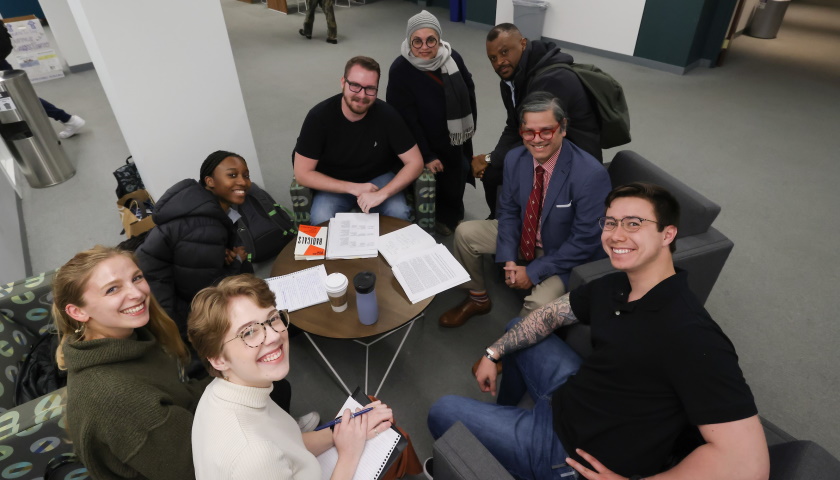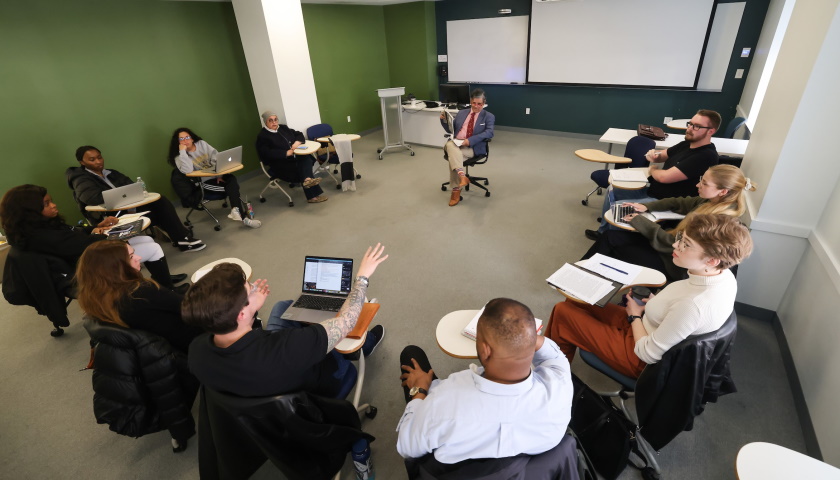Diplomatic Circles

Should you pour the cereal into the bowl first or the milk?
What begins as a tongue-in-cheek debate between a few global public policy graduate students before the start of their seminar in international relations theory class quickly morphs into a framework for viewing something much more complex: how to manage a pandemic.
Reece Holt, MAGPP ’23, posits that since the cereal (that is, COVID) was already in the bowl (the world), what really mattered most was the speed at which the milk (vaccine access) was distributed. Too little over too long a period would surely lead to a negative outcome—in one case soggy cereal, in the other a prolonged global crisis.
Professor Miguel Rodrigues pulls up a chair. A medical doctor and veteran diplomat who recently retired from more than two decades of distinguished service with the US Department of State, he rattles off data points and statements from leading global health organizations to drive the conversation forward. Students, clustering in a circle as they arrive, chime in with their own statistics and examples from their professional lives. When the discussion turns to pandemic policies in Germany, exchange student Lina Leona Gildenstern weighs in with a firsthand account of her government’s response. Others share perspectives from their home countries in Asia, Africa, Europe, and across North America. They often disagree, but when they do it’s collegial and opinions are backed by information.
Rodrigues challenges his students to think analytically, to consider every angle. “Let me play devil’s advocate—which is, as you know, my favorite role,” he jokes before introducing yet another angle on today’s topic: international pandemic response.
Roman Paddy Mukendi knows the challenges of world public health management better than most. Working for global research firm Abt Associates in his home country of Zambia, he oversaw a flagship UK governmental program that works to eradicate tropical diseases.
Mukendi enrolled in Suffolk’s master of arts in global public policy program to sharpen his skills and further his career, and appreciates the hands-on approach and robust debate he has found. “This course has helped me to improve my research, facilitation, and public speaking skills [for use in] public policy work,” he says.

A second circle
Eventually the students file into their assigned classroom. They arrange their desks in another circle, facing each other on an equal footing as they prepare for more spirited debate. They expect to be peppered with questions and are prepared to defend their positions on nuanced issues as they weigh new and sometimes conflicting information.
This structure is critical to the success of the course, says Rodrigues. He knows he is preparing the next generation of foreign service officers, as well as those who will staff NGOs and other key international agencies. They must be ready to analyze data, to speak up, and, above all, to make decisions.
“That’s what policymakers do: you have to make choices,” explains Rodrigues, who has advised government officials on such diverse issues as relations with the EU, Arctic sovereignty, and global public health threats including Ebola and COVID-19.
“This class is about precision because that’s a key skill in professional diplomacy.”
Real world prep for global careers
Genial and respectful, Rodrigues is also firm in demanding that students participate in the discussion and take clear positions on issues. He encourages each one to share their professional experiences while recounting his own, and invites former colleagues from his vast network to class to offer their views (in this instance, a former Canadian assistant deputy minister Rodriques worked with while posted to Embassy Ottawa).
Holt entered the global public policy program expecting to learn more about such issues as climate change, cross-border labor, and denuclearization. While he accomplished that goal, he says courses such as The Washington Center seminar and Rodrigues’s have also helped him apply that knowledge.
“Suffolk believes in experiential learning,” explains Holt. “My endgame is a career in public service where I can interact with people and fight for those who need it. If I am to find my place as a changemaker, it is essential I have direct interactions with those who are working in the fields I am interested in.”
For Gildenstern, a semester at Suffolk added an essential practical component to her graduate study—“I wrote policy papers, created a political campaign, worked with indexes, and had engaging discussions,” she says—that is proving especially valuable as she prepares to enter the job market this summer.
Her biggest takeaway from Rodrigues’s class? “No one will read a 10-page paper, so we must learn how to update [policymakers such as] a foreign minister about an international crisis in under a minute, as this is all the time they have.” That’s a challenge for graduate students accustomed to writing long, complex papers, she concedes, “but I believe it helped me prepare for the real world.”
Contact
Greg Gatlin
Office of Public Affairs
617-573-8428
Andrea Grant
Office of Public Affairs
617-573-8410



